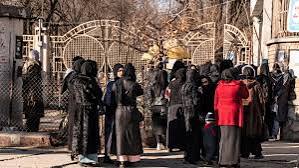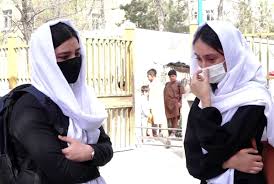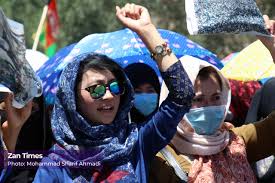Problems of girls in today’s Afghan society

Girls in today’s Afghan society are facing many problems and challenges. These problems, many of which have been exacerbated by the Taliban’s return to power, include:
-
Educational limitations:
- Closing of girls’ schools: Many girls’ schools have been closed and access to education for girls has been severely limited.
Prohibition of higher education: Girls are prohibited from continuing their studies in universities and higher education institutions.
which is one of the basic problems that most girls in the world face
- Closing of girls’ schools: Many girls’ schools have been closed and access to education for girls has been severely limited.
-
job limitations:
Prohibition of employment: Many girls and women are prohibited from entering the labor market and employment in different sectors.- Decreasing job opportunities: Due to the restrictions imposed by the Taliban, job opportunities for women have been greatly reduced.
Most of the women were busy during the republican period
- Decreasing job opportunities: Due to the restrictions imposed by the Taliban, job opportunities for women have been greatly reduced.
-
Forced and early marriages:
- Increase in forced marriages: Many girls are forced into forced and early marriages, which deprives them of educational and job opportunities.
- Violation of children’s rights: Early marriages cause violations of children’s rights and physical and psychological harm to girls.
-
Social and cultural limitations:
- Restrictions on commuting: Girls and women need to be accompanied by a confidant man to move around in the community and are prohibited from being in public places.
- Restrictions on clothing: The Taliban have imposed strict rules on the clothing of women and girls, which limit their individual freedom.
-
Gender violence:
Domestic violence: increase in domestic violence and lack of legal and social support for victims of violence.
Sexual Harassment: Girls and women are exposed to sexual harassment in public and private environments.

-
Health and hygiene:
- Health restrictions: Access to health and medical services for girls and women has decreased due to lack of facilities and restrictive laws.
- Health problems caused by early marriages: Early marriages cause serious health problems for girls.
-
Lack of legal and legal protection:
- Violation of women’s rights: non-implementation of protective laws and lack of justice for girls and women in the face of discrimination and violence.
Lack of access to justice: Girls and women cannot get their rights due to legal and social discrimination.
- Violation of women’s rights: non-implementation of protective laws and lack of justice for girls and women in the face of discrimination and violence.
These problems require immediate attention and effective measures from the international community, non-governmental organizations, and Afghans themselves. Raising awareness, providing legal and social support, and pressuring the Taliban to respect human rights and women’s rights can help improve the situation of girls in Afghanistan.
One of the reasons for the severe depression of Afghan girls is the closing of the door to education

Yes, closing the gates of education to girls is one of the main reasons for the severe depression of Afghan girls. Education plays a very important role in the personal, social and economic development of people, and restricting this basic right can have many negative psychological and social consequences. Some of the reasons and consequences of these restrictions are:
-
Losing future opportunities:
- Restriction in education: Lack of access to education makes girls deprived of career and professional opportunities in the future and this can lead to a decrease in hope for the future and a feeling of worthlessness.
-
Isolation and feeling of worthlessness:
- Lack of social connection: Schools and educational centers are a place for social interactions and personal growth. Being deprived of these opportunities can lead to feelings of isolation and worthlessness.
-
increasing family and social pressure:
- Traditional expectations: In many families and communities, education is considered as a way to progress and succeed. Restrictions on education can increase family and social pressures on girls.
-
Increasing the risk of forced and early marriages:
Early marriage: Lack of access to education can increase the possibility of forced and early marriages, which itself can lead to depression and other psychological problems. -
Restriction in the development of personality and identity:
- Decreasing personal growth: Education is an opportunity to discover and develop individual interests and talents. Being deprived of these opportunities can disrupt the development of girls’ personality and identity.
-
Decreasing self-confidence:
Feeling of helplessness: Deprivation of education can lead to a decrease in self-confidence and an increase in the feeling of helplessness in dealing with life’s challenges.

To deal with these problems, there is a need for multilateral actions by the international community, non-governmental organizations and families. These measures could include providing psychological support, creating informal educational opportunities, and pressuring the Taliban to reopen schools and respect girls’ education rights. Providing psychological and social support to girls can help reduce depression and improve their psychological and social condition.
Severe pressures from several social and family pressures have increased the depression of Afghan girls